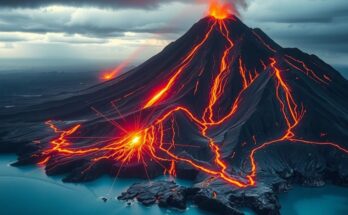Micha cárdenas, an artist and professor at UC Santa Cruz, addresses climate change through her exhibition *Probability Engine: Atlantic Overturning*, which opened during Nuit Blanche in Toronto. Highlighting dire predictions about climate tipping points, cárdenas uses interactive art to raise awareness of the critical state of the environment, aiming to inspire collective action against climate catastrophe.
In late 2022, Tim Lenton, the founding director of the Global Systems Institute, published a stark report detailing impending climate tipping points that threaten global ecosystems, notably the potential collapse of ice sheets and the disruption of North Atlantic ocean currents. Associate Professor micha cárdenas, who specializes in Critical Race & Ethnic Studies and Performance, Play & Design at the University of California, Santa Cruz, expressed her profound alarm regarding this report. She described it as “the scariest thing I have ever read” and implored the necessity for urgent awareness of the climate crisis. Cárdenas emphasized the significance of limiting global warming to 1.5 degrees Celsius to avoid triggering disastrous effects across the globe. As of November 2023, global temperatures had already risen by 1.44 degrees Celsius, leading to growing concerns echoed in scientific research such as a September 2022 essay in Science, which outlined various climate tipping points that could result in detrimental consequences, including the devastation of the Amazon Rainforest and the thawing of Boreal Permafrost. In light of these dire predictions, cárdenas is utilizing her multimedia artistry to highlight the urgency of climate change through her latest exhibition Probability Engine: Atlantic Overturning, which debuted on October 5 as part of Nuit Blanche, Toronto’s renowned all-night contemporary art event. This exhibition is anticipated to attract over 200,000 visitors, thereby amplifying its impact and audience reach. Notably, cárdenas’s work has been selected for the Extended Program of Nuit Blanche, extending the exhibition until October 13, where visitors can engage with interactive sculptures and virtual reality experiences that delve into the theme of climate collapse. The exhibition features interactive elements designed to elicit visceral responses and provoke contemplation on climate justice and potential societal transformations. Curated by Syrus Ware, the exhibition showcases the interplay of art and ecological awareness, framing it within a context of creativity and care. The centerpiece, Atlantic Overturning, is a striking 15-foot-long sculpture symbolizing the Atlantic Meridional Overturning Circulation (AMOC), which scientists warn is nearing collapse due to anthropogenic factors. Additionally, cárdenas collaborated with artists Marcelo Díaz Viana Neto and Star-Hagen Esquerra to enhance the exhibition’s narrative of impending ecological disaster. Noteworthy installations include sculptures representing significant crises due to climate change, alongside augmented reality experiences that allow visitors to visualize future risks such as rising sea levels. Cárdenas highlights the potential for art to elicit societal change, drawing on her previous projects aimed at addressing social justice issues. With her Probability Engine app, she provides poetic insights that inspire collective action against climate catastrophe, depicting art as a vehicle for emotional engagement and broader societal discourse. As cárdenas articulates, “This could be an opportunity to change society,” emphasizing the role of humanities in contextualizing scientific findings for public awareness. The support for Probability Engine stems from various institutions, including the Arts Division and the Center for Coastal Climate Resilience, underscoring its significance within the community and its alignment with critical climate discourse. For more insights into this urgent thematic exploration and to engage with cárdenas’s work, one may visit the website of the Critical Realities Studio.
The growing consensus among scientists indicates that the global climate is on the verge of reaching critical tipping points, which could lead to irreversible changes in ecosystem dynamics. Reports from experts, such as Tim Lenton, underscore the severe implications of allowing temperatures to rise beyond 1.5 degrees Celsius. Researchers have identified various tipping points, including the melting of polar ice caps and the destabilization of ocean currents, that could result in catastrophic environmental shifts. Interdisciplinary efforts, such as micha cárdenas’s art initiatives, aim to raise public awareness and inspire collective action to mitigate these looming threats.
The exhibition *Probability Engine: Atlantic Overturning* by micha cárdenas serves as a crucial conduit for expressing the urgent realities of climate change. Through innovative multimedia installations, cárdenas invites the public to engage emotionally and intellectually with the concept of climate justice. By merging art with scientific discourse, she aims to foster a broader understanding of the societal implications of climate issues and promote active participation in climate justice movements. In a time where ecological concerns are increasingly urgent, such initiatives play a significant role in bridging the gap between science and public understanding.
Original Source: news.ucsc.edu




